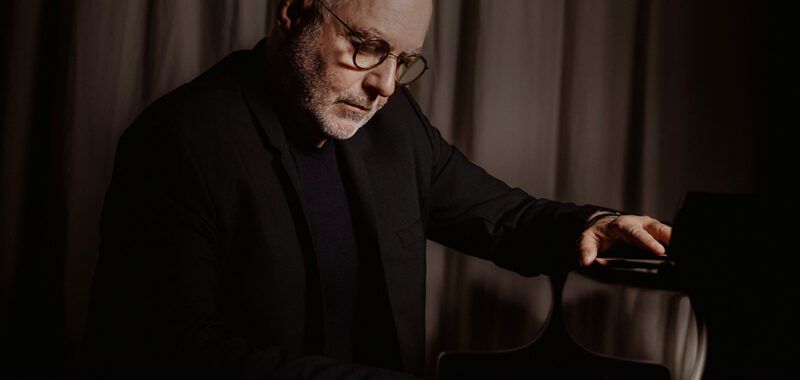

 Reading 5 minutes
Reading 5 minutes
The French composer Fabrice Aboulker navigates between several repertoires, or styles of music. From animated series (Martin Mystère, Maya the bee, Anatole Latuile, Pj Masks, …) to film scores (Mariages!, Je te Promets, Box 27, Arletty, une Passion Coupable, …) to musicals (Ali Baba, Excalibur, The Red Shoes, etc.) and chanson française, where he has collaborated with Michel Delpech, Marc Lavoine and Florent Pagny. Aboulker talks passionately about his métier. We caught up with him in his Paris studio where he discussed his early days, his fondest memories and the importance of copyright.
I fell into it because I come from a family of street entertainers. I like to say that I grew up amid revellers, disco parties, huge white glasses and disco balls.
My father was a journalist and writer, and my mother was in what we call showbiz, she was a novelist and producer, she discovered Daniel Balavoine and Patrick Juvet, who was, by the way, my piano teacher.
At the age of 15, I left school on condition that I go and earn a living.
This was followed by a quick stint at Salut les Copains! then Eddie Barclay gave me a chance in the artistic department, looking for unknown artists who dreamed of glitter, fame and being signed. Basically, my job was to say no.
One day, luck came along in the form of a young opener at the Olympia. That man was Marc Lavoine; my life changed and together we made over 100 songs like: “Pour une biguine avec toi”, “Les yeux revolver”, “Qu’est-ce que t’es belle”, “Le parking des anges”, “Paris”, etc.
I always thought that composing was a gift, but it takes a lot of hard work before you can finally say that you might be a composer.
When I was 14, with my friend Thibaut Chatel, we wanted to follow the family path. His brother Philippe Chatel had written Emilie Jolie . We wrote our first songs together.
Later, in search of a label, Dalida’s brother Orlando produced one of our songs: “Laisse-moi t’aimer sur fond Californie” by the young artist Nicolas Sorel. It was the first song to hit the airwaves in the summer of 1977. I had just turned 17 and I was looking to do what “Mama” did: produce ONE artist.
I would say that the common genre is melody.
I have a knack for finding a theme that stays in your head.
One thing is certain, navigating through the different repertoires constantly puts your status on the line.
In general, people don’t care about what you’ve done before; it can even work against you, because they can say “He’s too this!” or “He’s too that!” So you must keep a low profile because you’re always in the service of someone or something as a composer: in the service of a film, in the service of a singer, producer or director. They want the best from you and that’s it. The further you go, the more you have to give — but that’s also the beauty of this job.
My first song produced by Orlando.
My second, “Les Yeux Revolver” with Marc Lavoine.
The third would be the musical Ali Baba, played at the Zenith, a truly great journey with my friend Thibaut Chatel.
I’ll give you two more because, I must admit, it’s quite difficult to choose just three.
I composed the music for the film Mariages! I remember insisting on a try-out, and the director Valérie Guignabodet was the person who put her trust in me.
And the last memory is the creation of the musical tale The Red Shoes at the Folies Bergères, a moment that marked my artistic reunion with Marc Lavoine, after many years of separation.
Since I started, Sacem has always been a society in constant evolution: it responds to the new challenges facing the industry and the world, and it is present and attentive to its members.
When you become part of it, you realise that your protection, your interests, and your fair remuneration really are among the main preoccupations of Sacem and its Board of Directors.
Unfortunately, copyright is sometimes threatened — just recently I heard that the shareholders of a production company did not understand why composers were demanding that their authors’ rights be respected. In their minds, it seems simpler to pay them a salary and have them create music as a job. I fear for the next generations because the spread of ideas like these is dangerous for creation. If things go that way, it would mean that you would really have to be number 1 to earn a living, and all the others would find themselves in a precarious situation.
More informations:
– New record “Je me souviendrai de vous”
– © Laura Stevens –